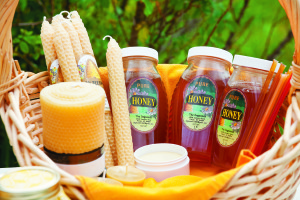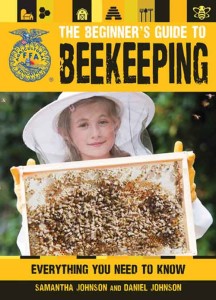
Basket of bee products: Candles, Honey, Honey Sticks, Lotions, Soaps, Lip Balms, etc.
Guest post by Samantha and Daniel Johnson
The first thing we’re going to tell you is that if you sat down and calculated just how much you’ve really put into each bottle of honey (factoring in your time, effort, and investment), you’d have to price each jar at an astronomical figure. Unfortunately, no one is going to pay you $3,000 for a one-pound jar of honey, no matter how much effort you put into it, so let’s go back to the drawing board and figure out a more realistic price.
The second thing we’re going to tell you is that honey prices vary greatly, depending on quality, variety, and even your location. You might see one-pound jars priced at $6, or you might see one-pound jars priced at $12, and we’ve even seen eight-ounce jars priced at $14, so there really isn’t a clear-cut answer to the question, “What should I charge?”
The quality of your honey is an important factor. Your presentation is another important factor. Have you raised your bees organically? Did you heat the honey during harvest? Honey that is raw and was organically raised will generally bring a higher price than honey that comes from bees that were treated with chemicals or honey that was heated during the harvest process.
While you can’t really put a price on your time and effort, it’s nice to be able to recoup some of your expenses. Evaluate the current honey market in your area by browsing farmers’ markets, grocery stores, health food stores, and other retail establishments that sell honey. Compare the prices for one-pound jars and then determine an appropriate price for your own jars. Consider offering discounts for multiple purchases, such as one jar for $8, two jars for $14, and three jars for $20. Many buyers appreciate a slightly discounted price in the case of multiple purchases, and such a discount might increase your sales. You can also consider the possibility of adding in bonus items, such as a free beeswax candle with the purchase of three jars of honey. Experiment with different promotions that might entice buyers to look more closely at your booth and the products that you’re offering for sale.
On the National Honey Board’s website, you’ll find a month-to-month chart of nationwide retail honey prices, courtesy of Bee Culture magazine. In September 2012, the average price for one pound of honey was $5.73, up nearly $2 from the average September 2006 price, which was $3.91. Obviously, these figures are average prices and will fluctuate from region to region, which is why it is important to investigate the prices in your area before determining what to charge for your own honey.
 Excerpted from The Beginners Guide to Beekeeping written by Daniel & Samantha Johnson. All rights reserved.
Excerpted from The Beginners Guide to Beekeeping written by Daniel & Samantha Johnson. All rights reserved.










21 Comments
Hi I’m interested in the honey business here in Papua New Guinea and would like to receive more tips.
fuck it big bread
I love the picture. It makes me think of murder.
Im trying to get all the things needed for my first beehives. Here is my gofundme if anyone is interested in sharing it on fb or other social medias. Also, I subscribed to the newsletter!
https://www.gofundme.com/my-first-beehives
Thanks in advance!
We are just starting out! Plan to sell our honey at our local farmers market in Shelbyville In! Would appreciate advice on finding the least expensive honey jars and approximate price we should expect to charge everything is organic! Thank you
Honey bees and comb 67 years old 1800.00 you remove. At 100 year old farm house in Hampton Ga. Contact me at email address.
Great info!
This article gives no useful information.
I am completely lost on how you can claim “organic honey”. I see this often, but have to wonder how people can control where the bees fly – I cannot imagine an area that is certified completely organic in a full range of a hive. Can you give me some clarity on how this works?
thanks,
Lann
i doubt seriously that organic honey can be produced anywhere in the US. bees fly 2 miles or more to forage and you can’t keep them off of non-organic farms, etc
U.S. honey is not organic, from anywhere, according to any set certifications. But it can come from organically managed hives ( no chemical treatment or antibiotics) in as rural or away from known agri centers. This for now is the best we can do. But it is not bad when keepers all over use horrible chemicals on the bees and in the hives and still say pure!
Pleased to find you and looking forward to learning more about successful bee keeping.
Hi ya’ll, what about a full frame of natural comb? Any idea how to price this out ? Should this also be by weight? Thank you MisBEEhaving Bee’s Pearl River County Missisippi
Hi,
Could you give me the best three brands of honey? I need to use honey instead of sugar for health issues, so, I need to find pure and healthy honey, without a lot of sugar.
Thank you for your help
I want to sell my grandfathers honey I found under my house that’s been passed down. Turned out my great grandfather had a honey company and there are a lot of mason jars, and big moonshine jugs full of honey I found under the house from the early 1900’s. What do you think I can sell it for?
I also have some “issues” with the term “organic” honey. At least in my area. In western Montana most of my neighbors spray weeds in some form. Especially in the very rural area I live. I sell my honey as “raw or natural” at a local farmers market and it has sold well with many great comments. I believe that beekeepers can organically treat their hives, although I might question the effectiveness of that, but the bees still migrate around searching for what they need. They will no doubt forage in a sprayed area. Seems to limit the term “organic”.
Hi
You people have a pretty good idea not perfect but no one is
I’m not a bee keeper I’m an Apiarist have 500 hives and expanding
Here in Australia we have had several large court actions between companies who buy honey from Apiarist
The general consensus here that some companies not all stuff the honey by boiling it adding chemicals thinners , and general crap that degrades fantastic honey
Please all of you people out there please do the right thing , sell your honey unadulterated Just Pure Unheated Unblended Honey
Give the people that have never had the opportunity to buy fantastic honey the opportunity
And everyone should see a decent $ return for our fantastic product
I refuse to sell to large companies because I refuse to let them stuff up all the hard work the Bees and I Do
China is the worst of the lot for buying quality and returning rubbish
Excited to read and get others ideas on beekeeping.
Hello I’m working towards being a successful beekeeper. I started a gofundme to help get me started if anyone would like to lend a helping hand.
https://www.gofundme.com/f/rj8s3t-save-the-honey-bee?utm_source=facebook&utm_medium=social&utm_campaign=p_lico%2Bupdate&fbclid=IwAR3-uOgJb-CQAoUwqsI7Q2VlXsSCz77jSXdPP4hyWdaSK_Wjuzx_wlYf40g
Thanks for the information. Just impressed with the variety of types of honey and what to do with it!
Nice post! Thanks.